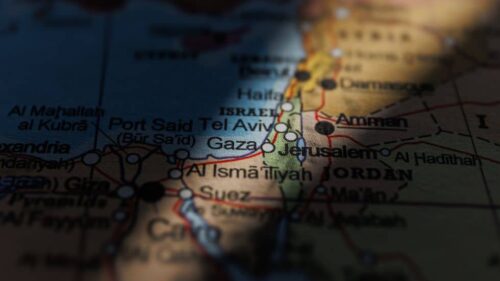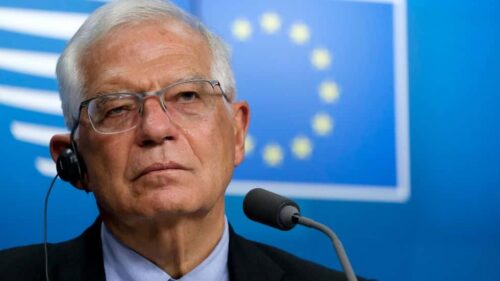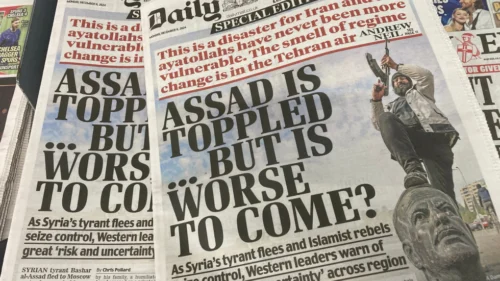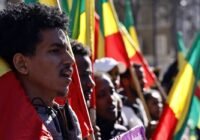Fair Observer’s board member and former chairman, Gary Grappo, having spent a good part of his career as a diplomat in the Middle East, possesses a deep and extensive knowledge of the region, its actors and its ongoing drama. Although no longer active in a region, his analysis of events in the Middle East is welcome for two reasons. The first concerns his awareness of the diversity of factors at play and his sense of how they interact. The second is his indefectible commitment to articulating a point of view consistent with the US-centered worldview that underpins the permanent State Department’s foreign policy, independently of the identity of specific presidents.
Given the central role the United States has played in global politics since the end of World War II, we observers of history need to be regularly reminded of the lens through which the US foreign policy establishment sees the world. Every lens magnifies some elements and distorts others. A key part of Fair Observer’s vocation is not only to expose its readers and contributors to the effects of the different lenses, but also to develop our collective understanding of how those lenses reflect and refract our perception of global reality. Mine is obviously very different from Gary’s or the State Department’s.
In a piece we published earlier this month, with the title, “The Middle East 2025: The Good, the Bad and the Tragically Ugly,” Gary offered us a wide-ranging review of the key dramas unfolding across the Middle East, North Africa and West Asia. The former diplomat sounded a note of guarded optimism when he observed that “the region remains as full of opportunity as it is fraught with external and internal political tension and conflict.” His dominant tone, however, is pessimistic: “Some of the region’s struggles are as far from resolution as they’ve ever been.”
Returning to the Beltway lens, US politicians possess a set of shared ideals, which they wield as if they were holding in their hand the gavel of universal justice. “Democracy” and “human rights” are the prominent concepts that permit State Department officials and pundits alike to categorize other nations and groups as being either “on the right side of history” or the wrong side. An extreme degree of wrongness places them in an “axis of evil.” Less radically, Gary calls the evildoers “the region’s troublemakers” and identifies them as: “Iran, Russia and the Islamic State.”
But all is not well even among those who are spared the epithet of troublemaker or wheel on the axis of evil. Summing up a problem that he sees as broadly undermining democratic governance throughout the Middle East, Gary offers us this truism: “Publics remain dissatisfied with their governments, almost none of which are accountable to their people.”
Today’s Weekly Devil’s Dictionary definition:
Accountable to the people:
The basic principle of democracy that founds its theoretical moral legitimacy; also, the principle that can conveniently be discarded by ensuring that the kinds of people who are elected will never be held accountable for the worst collective decisions they irresponsibly make, including the overthrow of democratic leaders or foreign countries, waging and funding illegal wars and supporting genocide.
Contextual note
Gary finds one occasion to trot out the predictable bromide identifying Israel as “the Middle East’s lone democracy.” In his mind, it’s clear that if Israel is a democracy, it must be “accountable to the people.” Gary reminds us, however, that in practice, Israeli Prime Minister Benjamin Netanyahu’s government is accountable not to the people as a whole (including Palestinians), nor even to the Jews, but to “right-wing factions” that now have “unprecedented influence in the Knesset.”
Israel’s proclaimed status as “lone democracy” deflects attention from the easily observed fact that it is an apartheid state openly conducting ethnic cleansing and systematic genocide. I agree that like “democracy” itself, those accusatory epithets are only “words,” which means they are “debatable,” designed, some will say, to “confuse the issue.”
In the nation’s moral system, thanks to the dogma of the first amendment of the US constitution, speech is free; words demand no accountability. Acts do, but for that accountability to be applied we must agree on the meaning of the words. The fact that observed acts can be dismissed as “mere words” brings home the real message: that accountability will always be elusive, especially when attempting to accuse a “lone democracy.”
Apartheid, ethnic cleansing and genocide have an unquestionably negative connotation. That may explain why in an article about the current state of play in the Middle East, Gary never alludes to them. Instead, like Monty Python, he looks at “the bright side of life” in Israel. “Israel’s superior military prowess, technology, intelligence and firepower,” he tells us, “paired with indispensable support from America produced positive results across the region.”
It continues as Gary finds the persuasive words to make us believe. “For now, however, the ongoing negotiations between Tehran and Washington are an unambiguous good.” Really, Gary, I have to stop you there. Unambiguous? Just before this we learn that “it is almost inevitable that Israel, with the likely assistance of the US, will attack the Islamic Republic.” In a short space we jump from “unambiguous good” to “inevitable” transcontinental war! In such a case, I wonder if the survival of humanity hasn’t itself become a highly ambiguous proposition.
This is where the question of whether governments are effectively “accountable to their people” arises. We may legitimately wonder whether the problem is confined, as Gary seems to suggest, to the Middle East. Some would claim there’s a serious problem of accountability within the US itself, the beacon of democracy. It may soon be time for some new populist leader to stand up and campaign on the slogan, “Make America Accountable Again.”
Historical note
After noting that the strength of “Iran has been significantly diminished while that of another, Israel, has been elevated,” Gary reveals how the groupthink at the State Department and among US allies functions, especially when applied to judging the positive or negative features of unfolding events. “From the perspective of the West and its moderate Arab allies, all of this is good news.”
The keyword here is “moderate,” an epithet that has been routinely applied not only to autocratic regimes allied to the US but also to groups such as al-Qaeda and ISIS in Syria and elsewhere in the region. As economist Jeffrey Sachs recently revealed, the CIA’s operation Timber Sycamore, ordered by President Barack Obama, was launched to arm and train Syrian rebel groups fighting against dictator Bashar al-Assad’s regime during the Syrian Civil War. Its principal objective consisted of aiding extremist, jihadist factions opposed to Assad. Syria’s current leader, Ahmed al-Sharaa, who overthrew the Assad regime last November, historically worked for both al-Qaeda and ISIS. Thanks to Timber Sycamore, those officially designated terrorists received indirect support from the US, who conveniently referred to the jihadist groups it supported as “moderate rebels.”
Every US regime has had to play a difficult and decidedly ambiguous role concerning the sides to back in recent wars in multiple Middle East countries. Gary respects that ambiguity, which has typically consisted of US presidents, independently of their party affiliation, aligning with every position taken by Israel while at the same time officially endorsing the idea, or vaguely formulated intention, of implementing a two-state solution. It’s something of a Dr. Jekyll and Mr. Hyde situation, in which the good doctor attempts to play the role of an honest broker and the alter ego becomes an accomplice in atrocities. Gary dutifully reminds us that “Israel and Netanyahu bear their own share of the responsibility.” But at the same time, he studiously avoids mentioning the object of that responsibility: genocide or, at the very least, massive and persistent war crimes. Every recent State Department has done the same.
And he sticks to the script concerning the desired outcome with this undoubtedly accurate assertion: “Accepting the inevitability of a Palestinian state, as more than 100 foreign governments already have, would dramatically alter the political landscape, positioning Hamas and its extremist supporters as the enemies of peace.”
The real paradox — to the point of manifest absurdity — lies in the fact that the US has consistently used its veto at the UN Security Council to oppose every proposed resolution to grant statehood to Palestine. There’s no sign that that is likely to change under President Donald Trump.
*[In the age of Oscar Wilde and Mark Twain, another American wit, the journalist Ambrose Bierce produced a series of satirical definitions of commonly used terms, throwing light on their hidden meanings in real discourse. Bierce eventually collected and published them as a book, The Devil’s Dictionary, in 1911. We have shamelessly appropriated his title in the interest of continuing his wholesome pedagogical effort to enlighten generations of readers of the news. Read more of Fair Observer Devil’s Dictionary.]
[Lee Thompson-Kolar edited this piece.]
The views expressed in this article are the author’s own and do not necessarily reflect Fair Observer’s editorial policy.
Support Fair Observer
We rely on your support for our independence, diversity and quality.
For more than 10 years, Fair Observer has been free, fair and independent. No billionaire owns us, no advertisers control us. We are a reader-supported nonprofit. Unlike many other publications, we keep our content free for readers regardless of where they live or whether they can afford to pay. We have no paywalls and no ads.
In the post-truth era of fake news, echo chambers and filter bubbles, we publish a plurality of perspectives from around the world. Anyone can publish with us, but everyone goes through a rigorous editorial process. So, you get fact-checked, well-reasoned content instead of noise.
We publish 3,000+ voices from 90+ countries. We also conduct education and training programs
on subjects ranging from digital media and journalism to writing and critical thinking. This
doesn’t come cheap. Servers, editors, trainers and web developers cost
money.
Please consider supporting us on a regular basis as a recurring donor or a
sustaining member.
Will you support FO’s journalism?
We rely on your support for our independence, diversity and quality.











Comment